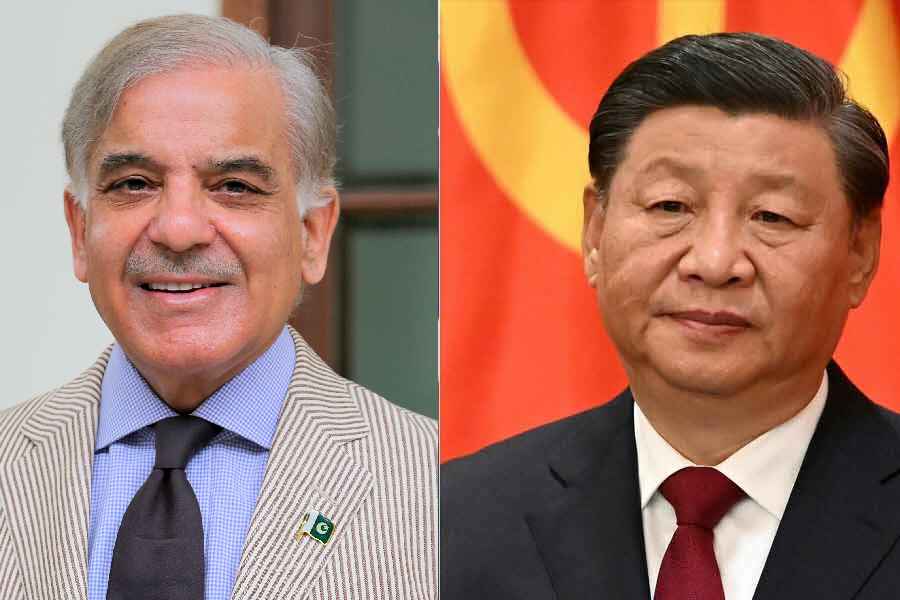Prime Minister Shehbaz Sharif emphasized the enduring and robust relationship between Pakistan and China as he embarked on a five-day official visit to Beijing from June 4 to June 8. This visit, at the invitation of Chinese President Xi Jinping, aims to further strengthen bilateral ties and initiate the second phase of the multi-billion dollar China-Pakistan Economic Corridor (CPEC) projects in Pakistan.
Unwavering Partnership
Sharif, 72, is making his first visit to China since assuming office for a second term in March, leading a coalition government under the Pakistan Muslim League-Nawaz (PML-N) party. He described the Pakistan-China relationship as “unshakable,” referring to the two nations as “iron brothers” with a deep, enduring friendship. “We are two iron brothers, our friendship is unshakable, and our hearts beat together,” Sharif stated in an interview with China’s state-run Xinhua news agency. He praised China’s unwavering support during challenging times, affirming Beijing as one of Pakistan’s most trusted allies.
)
Launching CPEC’s Second Phase
A significant focus of Sharif’s visit is the inauguration of the second phase of the China-Pakistan Economic Corridor (CPEC), a cornerstone of China’s ambitious Belt and Road Initiative (BRI). The CPEC, valued at USD 60 billion, aims to connect Gwadar Port in Pakistan’s Balochistan province with China’s Xinjiang province, enhancing infrastructure and economic development in both regions. The BRI, through initiatives like CPEC, seeks to expand China’s global influence by funding infrastructure projects worldwide.
Learning from China’s Development Model
Sharif’s visit underscores Pakistan’s desire to learn from China’s rapid development and modernization. Reflecting on his first visit to China 40 years ago, Sharif noted the country’s remarkable transformation through dedication to science and technology. “Today, China has become a giant through vision, hard work, and serious and untiring efforts,” he said, adding that the success of China’s development model is indisputable.
Pakistan aims to emulate China’s advancements in various fields, including information technology and artificial intelligence, to foster economic cooperation and achieve rapid development. Sharif expressed interest in adopting China’s governance practices to enhance reforms, combat corruption, and create favorable conditions for Chinese investors. These efforts are seen as vital for modernizing Pakistan’s economy and improving living standards.

Economic and Social Cooperation
The visit also aims to bolster cooperation under the CPEC framework. Chinese Ambassador to Pakistan Jiang Zaidong highlighted that the BRI project has already brought significant investments and job opportunities to Pakistan, with over USD 25.4 billion in direct investment, creating 236,000 jobs, 510 kilometers of highways, more than 8,000 megawatts of electricity, and 886 kilometers of core transmission network. These developments have been crucial in driving Pakistan’s economic and social progress.
Sharif’s agenda includes enhancing trade and investment ties, promoting interaction between enterprises from both countries, and utilizing special economic zones. By leveraging Pakistan’s labor advantages, the two nations aim to establish joint ventures, facilitate technology transfer, and boost manufacturing output, contributing to the next phase of CPEC’s growth.
ALS0 READ: Ashok Leyland Jumps 6%
Addressing Pakistan’s Economic Challenges
Pakistan’s economy is currently facing severe challenges, including low foreign exchange reserves and the need for external financial assistance. The country has formally requested a bailout package from the International Monetary Fund (IMF) worth between USD 6 billion and USD 8 billion, with potential augmentation through climate financing. In this context, Sharif’s visit to China is particularly significant as it seeks to secure further financial support and investment.
During his stay, Sharif will meet with Chinese Premier Li Qiang and Zhao Leji, Chairman of the Standing Committee of the National People’s Congress. These discussions are expected to produce a comprehensive blueprint for the future of China-Pakistan relations, focusing on mutual interests and strategic cooperation.
Strategic and Sectoral Collaboration
In addition to economic talks, the visit aims to enhance cooperation in security and defense, energy, space, science and technology, and education. Sharif will engage with corporate executives from leading Chinese companies in sectors such as oil and gas, energy, and information and communications technology (ICT). These discussions will explore ways to deepen bilateral cooperation and support Pakistan’s economic development.
Sharif is also scheduled to address the China-Pakistan Business Forum in Shenzhen, where he will interact with prominent businesspersons, entrepreneurs, and investors from both countries. This platform will provide opportunities to promote bilateral trade, attract investment, and explore collaborative ventures in various sectors.

Sharif’s Learning from China’s Poverty Alleviation
Another key agenda item for Sharif’s visit is to learn from China’s successful poverty alleviation strategies. Under Xi Jinping’s leadership, China has lifted millions of people out of poverty, and Pakistan seeks to adopt similar approaches to support its own citizens. Sharif emphasized the importance of learning from China’s experience to create sustainable solutions for poverty reduction in Pakistan.
Prime Minister Shehbaz Sharif’s visit to China underscores the deep and multifaceted relationship between the two countries. By launching the second phase of CPEC and enhancing bilateral cooperation across various sectors, the visit aims to drive economic growth, promote development, and strengthen the strategic partnership. As Pakistan navigates its economic challenges, the support and collaboration with China remain crucial for its path towards stability and prosperity.












